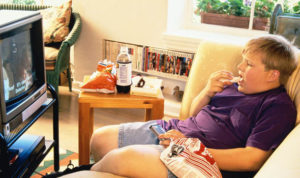If your prize petunias expire from overwatering, your shih tzu’s bloated belly drags along the floor during walkies or your hoverboard rusts from abandonment to the elements of the English summer – who’s to blame? If we don’t take proper care of what’s ours, what needs looking after, we need to accept accountability for any mistreatment.
If a child is overweight or obese the fault lies with the feeder.
A young person can legally leave their parents’ home at sixteen years of age or be legally independent of guardianship at eighteen. Up until that point, the parental role is still operational, thus children’s eating habits and physical activity are their responsibility.
I attended the theatre recently and witnessed a mum buy her obese son a large full-leaded Pepsi and a substantial bag of M&M’s. A month ago I hopped on the number 73 to Marble Arch and sat opposite an obese 10ish-year-old girl who was mid-flow with gratitude to her father for the massive bag of chips she was devouring. Countless times I’ve been in the queue at Nero’s, Pret or Starbucks and in front of me the parent is allowing their overweight child to order a hot chocolate with a panini, brownie or muffin as a side.
According to a recent ITV report: a third of ten- to eleven-year-olds, and over a fifth of four- to five-year-olds are overweight or obese. Parents and guardians organise the Ocado shop, trawl the aisles of Tesco’s and laden the fridge. They control the purse strings in a restaurant, when ordering a takeaway and in most situations where the child is given nourishment.
Adults are considered overweight if they have a body mass index (BMI) between 25 and 29, and obese with a BMI of 30 or above. With children it’s measured in percentiles, for example: 85th percentile to the 95th percentile is considered overweight for a child. This is also called ”BMI for age”; it’s a comparison of other children of the same age and gender rather than a number.
It doesn’t take four years at medical school to visually comprehend if a child is overweight or obese.
A parent wouldn’t allow a child to sit in the back of the family Volvo without the seatbelt fastened, let their mini-me hang out in the back streets of Peckham at 3am or give them the opportunity to start experimenting with liquid G, smack or legal highs – all of which are dangerous and could inflict damage to their bodies.
According to Susan Jebb, Professor of Diet and Population Health at the University of Oxford, ”Overweight children are more likely to become overweight adults”. High blood pressure, type 2 diabetes, strokes, heart disease and cancer are all a serious risk if you’re carrying excess body fat. Over-feeding a child, or feeding a child surplus high-calorie and sugary fodder is putting their bodies in jeopardy.
If a child is obviously overweight, the parent or guardian should actively tackle the issue.
You don’t give obese children cans of Coco Cola, Haribo and Häagen-Dazs – they’re laced with sugar. Pudding is a no-no and so are visits to Ronald McDonald’s gaff. Don’t overload their plates at meal times and give potatoes, pasta and bread the heave-ho. Cut out convenience food and cook your little ones healthy meals.
Every trip to the cinema doesn’t have to involve a hefty bag of pick ’n’ mix washed down with a Slush Puppie. If your child is obese – this is abuse.
MacBooks, Xboxes and social media are all great for working out phalanges but not so good for physiques. As well as making sure children aren’t overindulging on cornettos, candy floss and finger lickin’ good at the funfair, parents are responsible for encouraging their offspring to p-p-pick up a tennis racquet, and not a penguin.
The NHS website states: Obesity levels in the UK have more than trebled in the last 30 years, and on current estimates, more than half the population could be obese by 2050.
Yes, children ‘sneak food’ from cupboards and fridges – don’t be the fatty carbohydrate supplier.
Most of the time it’s a choice to have children. And yes, we all lead busy and fast-paced lives. It might be easier to order in a Domino’s than to chop broccoli florets and bung salmon fillets in the oven. It might be more cost-effective to buy ready meals and frozen croissants than to hit the meat counter or stock up on a decent granola. And it might distract your little darling from exercising their larynx if you let them have a free-for-all when dining out. You have to make the time, find the money and – if your kids can’t abide by simple etiquette – don’t take them out.
For the last ten years, the media has thrust healthy eating and exercise advice, awareness campaigns and information down our throats like a steak and kidney at a pie-eating competition. Unless you’re surviving in the wilderness Bear-Grylls-style – there’s no excuse.
